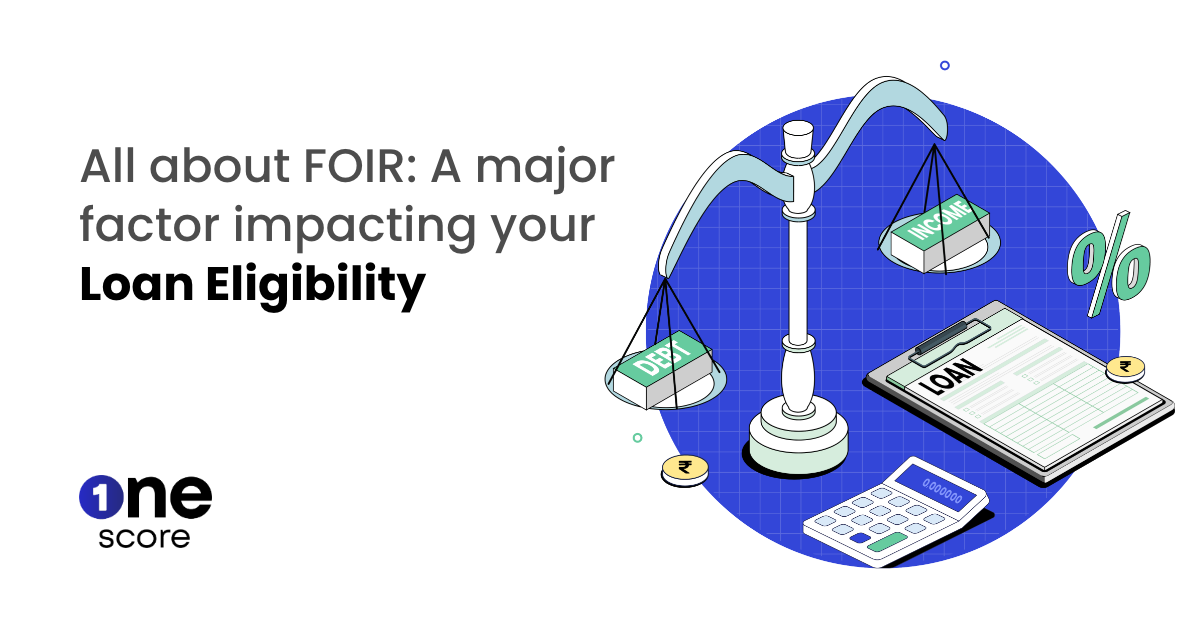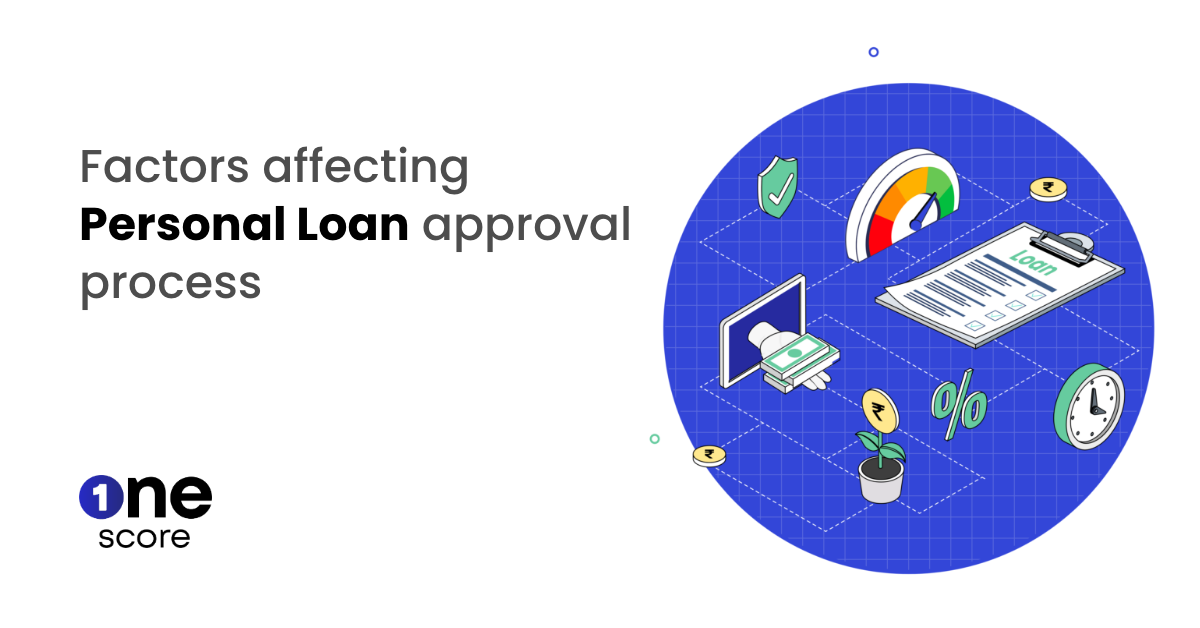What is FOIR? How does it impact your loan application?

If you have been planning a big ticket purchase, you may have realized the importance of two things by now: having liquid savings and access to credit. Whether it is the house of your dreams or the car you have been eyeing for years, all major expenses require a bit of financial planning. While your savings take care of more upfront expenses like down payments, having access to credit makes your goals instantly affordable. I mean, you wouldn’t want to wait forever for your dream car, right?
Being informed about the factors affecting your creditworthiness gives you an upper hand when applying for a loan or negotiating the repayment terms. FOIR (fixed obligations to income ratio) is one such significant factor lenders or financial institutions consider while assessing your loan application. Some people also refer to it as the DTI (debt-to-income) ratio. Lenders use the FOIR or DTI ratio to check if you can afford a new loan by comparing your fixed expenses, such as existing loans, rent, and other regular payments, to your income.
This helps lenders determine your disposable income and decide whether or not it is sufficient for you to be able to take on an additional loan. Sounds like a fair deal, right? The banks want to protect you from falling into a debt trap and also avoid taking on risky customers. But what if you apply for a loan without doing the homework and discover your loan application is weak due to a high FOIR? Read on to understand the implications.
How does FOIR impact your loan application?
FOIR has a significant impact on your loan eligibility, the loan tenure and interest rate you qualify for, and the overall terms of the loan. Here are a few scenarios that you may encounter during your loan application due to a high FOIR.
1. Rejection of the loan application
A higher FOIR signifies that your current financial obligations are eating up a large portion of your income. In the eyes of a lender, this makes you a risky borrower with a high chance of default, which may lead to your application getting rejected.
2. A smaller loan amount
A higher FOIR can also limit the amount you are able to borrow. Instead of directly denying you a loan, lenders may offer you a smaller loan amount.
3. Higher interest rates
Some lenders may still approve your loan despite a high FOIR, but at a high interest rate. This increases the overall cost of your loan.
4. Longer loan tenure
In some cases, lenders may extend your loan tenure to reduce your monthly outgo and bring your FOIR within an acceptable range. However, remember that a longer loan tenure means higher interest paid over the life of the loan. Hence, having a repayment plan may help you determine if you should accept these terms or wait it out.
To avoid settling for these terms and availing of the best loan offer, it might help to fix your FOIR. Before we get there, let’s first understand how it is calculated.
How is FOIR calculated?
To calculate FOIR, add up all your monthly financial obligations, such as rent, living expenses, any other credit card bills or EMIs, etc., and compare it with your monthly income.
** Formula for FOIR:**
FOIR = (Total Fixed Obligations / Monthly Income) * 100
Let us understand this with an example. We will assume your salary is Rs. 1,00,000 and your monthly expenses are as follows: Rent: Rs. 20,000; Car EMI: Rs. 10,000; and lifestyle expenses: Rs. 10,000
So your total monthly obligations are Rs. 40,000.
Now let’s compare it with your income to find out the FOIR.
40000/100000*100 = 40%
(Note: FOIR calculation does not consider investments, tax deductions, etc.)
Typically, FOIR below 40–50% is considered good, which means the lender is confident about your capacity to repay the borrowed sum. However, the threshold of FOIR may differ from lender to lender. The lower your FOIR, the higher your chances of getting approved for a loan, provided you meet the other eligibility criteria as well.
How to reduce your FOIR and increase your chances of loan approval
1. Apply for a joint loan
A co-applicant with a lower FOIR and a strong income can boost your loan application. By sharing the burden of monthly EMIs with the co-applicant, you can reduce your monthly obligation. This assures lenders that you will be able to repay the EMIs, and there will be fewer chances of default.
2. Maintain a good credit history
Ensure that you always pay your credit card bills and any other existing EMIs on time and in full. Maintaining low credit utilization can also significantly reduce your FOIR and improve your credit score.
3. Avoid applying for multiple loans
Having multiple loans under your name not only increases your financial obligations but also makes you appear credit-hungry, which may give lenders the impression that you are struggling to manage your existing debts and obligations.
4. Reduce your monthly expenses
It might help if you cut down on your cost of living. It could be a decision as big as moving in into a smaller house or changing small habits like taking public transportation, preferring home-cooked meals over expensive dining, etc.
5. Increase your income
A hike in income can further improve your case. Therefore, look for opportunities to increase your income or start additional streams of income. This can include negotiating a raise at work, freelancing, or starting a side hustle.
6. Negotiate the loan terms
You can negotiate the loan terms with the lender and either settle for a longer loan tenure or a higher interest rate. While this may move your application forward, it also increases the overall loan cost.
Conclusion
Most borrowers are clueless about the various factors that determine their eligibility for a loan and discover them after getting rejected for one. A more proactive approach to your loan application might save you this hassle. You can start by researching the eligibility criteria and loan terms specified by different lenders and deciding which one suits you better. Calculating your FOIR is one of the significant steps, among other things like checking your credit report, keeping KYC and income documents handy, having a repayment plan in place, etc. Once you know your FOIR, you can take the above-mentioned measures to reduce it and decide the right time to apply for a loan. This will help you avoid unnecessary hard inquiries and improve your chances of getting approved for a loan.
Frequently Asked Questions
- What is the ideal FOIR?
The FOIR ratio may differ from lender to lender. Typically, a FOIR ranging between 40-55% is considered good for your loan application.
- Is FOIR an eligibility criteria for all types of loans?
FOIR is considered an important factors in all types of loan applications, including home loans, car loans, personal loans, etc.
- How does FOIR impact my loan application?
FOIR is an indicator of your current financial standing and your ability to take on additional debt. It informs the lender about your creditworthiness and decides the fate of your loan application.
- Can my loan application be approved despite a high FOIR?
A high FOIR reduces your chances of getting approved for a loan; however, you may still get a loan by negotiating the terms of the loan with the lender.
**Disclaimer: The information provided on this webpage does not, and is not intended to, constitute any kind of advice; instead, all the information available here is for general informational purposes only. FPL Consumer Services Private Limited and the author shall not be responsible for any direct/indirect/damages/loss incurred by the reader in making any decision based on the contents and information. Please consult your advisor before making any decision.




- OneScore , October 30, 2023

